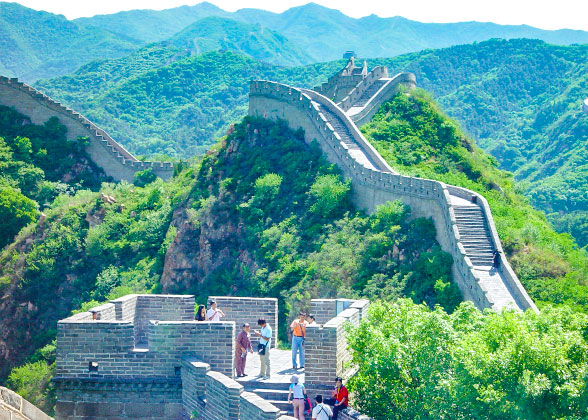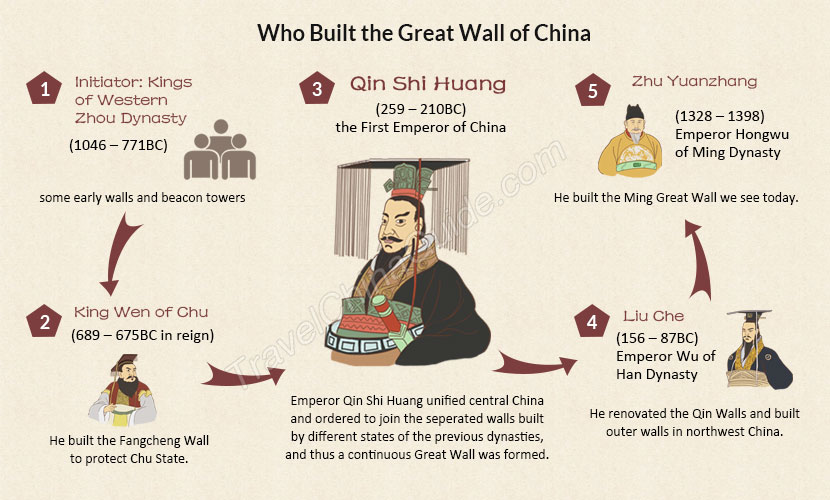Who built the Great Wall of China?
The Great Wall of China was built by a labor force including soldiers, common people and criminals in fact. Emperor Qin Shi Huang is widely recognized as the first man who ordered to build the Great Wall of China; however, it is not him. Early in the Western Zhou Dynasty (1046 - 771 BC), some walls and beacon towers were built. During the Spring and Autumn Period (770BC-276BC), the King Wen of Chu State ordered to build the Fangcheng Wall to protect his state.
After the unification of China in Qin Dynasty (221 - 207 BC), Qin Shi Huang commanded to connect and extend the separate walls of previous states to form a complete military defensive line, the Great Wall of China. Many emperors of following dynasties also built the wall, including Han Dynasty (202 BC - 220 AD) and Ming Dynasty (1368 - 1644 AD).
Who made the Great Wall of China? The soldiers were the main power to build the Great Wall at that time. For example, Emperor Qin Shihuang ordered General Mengtian to lead around 300,000 soldiers to protect the defensive line and build the wall after defeating the Huns. This project took more than 9 years. In order to take care of the soldiers and make them feel settled, the court even arranged for widows to marry them.
Besides those soldiers, the Emperor Qin Shihuang also forced common people to join the construction of this project. There were also many other dynasties taking the same actions. In 555, Northern Qi Dynasty (550 – 577), the emperor used common people to build the wall from Xiakou to Hengzhou, which is more than 450 kilometers (280 miles) long. In the Sui Dynasty (581 - 618 AD), the widows were also forced to work because all the male laborers had been used already.
The criminals were forced into labor as punishment. Their hair would be shaved off and made to wear iron rings. During the day, they were ordered to take turns patrolling the wall, while at night, building and extending the wall. They were required to work for 4 years according to laws of Qin Dynasty.
 |
How many people were needed to build the Great Wall of China?
There is no accurate answer for how many people worked on the Great Wall of China as the construction lasted for over 2,500 years. Here is some rough estimation based on historical records. In Qin Dynasty, Emperor Qin Shi Huang sent about 300,000 soldiers and 500,000 common people to the construction sites; some experts estimated it 20% of the country’s population, nearly one million. About 100,000 people were taken to build the wall in 446, during the Northern Wei Dynasty (386 – 534). In Northern Qi Dynasty (550 – 577), the wall from Xiakou to Hengzhou used 1.8 million laborers to build. The wall of Sui Dynasty (581 - 618) in Inner Mongolia used about one million people.
How many people died building the Great Wall of China?
 For the not well-developed productivity in ancient times, there was no doubt that the construction of the Great Wall could be a disaster for common people, and so many people lost their lives during the project. During the Qin Dynasty (221 - 207 BC) only, nearly one million people was forced to build it. But only tens of thousands of them survived from the heavy work and difficult conditions. That is to say, those died from the building of the Great Wall reached almost one million. Some of them may have starved to death, some may have died from excessive fatigue and some may even have been flogged to death.
For the not well-developed productivity in ancient times, there was no doubt that the construction of the Great Wall could be a disaster for common people, and so many people lost their lives during the project. During the Qin Dynasty (221 - 207 BC) only, nearly one million people was forced to build it. But only tens of thousands of them survived from the heavy work and difficult conditions. That is to say, those died from the building of the Great Wall reached almost one million. Some of them may have starved to death, some may have died from excessive fatigue and some may even have been flogged to death.
Are there dead bodies in the Great Wall of China?
According to the situation at that time, it was very likely to bury the dead bodies under or near the Great Wall. Due to the heavy construction work, the controllers would not like to waste time to send the dead bodies away for burial. The legend Meng Jiangnu's Bitter Weeping is also a proof of this. It was about a wife who cried on the Great Wall and wept the section into collapse where her husband was buried. However, this guess has not been proved true since none of the dead bodies have been found under or near the wall yet.
The Legendary Origin of the Great Wall Construction
Once upon a time, Emperor Qin Shihuang was attracted by a kind of necromancy, which made him generate a strong desire of immortality because he thought his empire could be safe and strong as long as he was immortal. At the same time, a necromancer called Lusheng gradually gained the trust of Qin Shihuang. Qin Shihuang spent a great deal of efforts to seek the elixir, but all of these actions ruined. He asked Lusheng to find the god for guidance. When Lusheng came back, he brought a book which recorded that the Huns would end the Qin Empire. Qin Shihuang finally found an aim to abreact his upset and he ordered the general Mengtian to conquer the Huns. When the soldiers defeated the Huns, Qin Shihuang still worried so much because the Huns had no fixed camps and the safety of the empire could not be guaranteed forever. As a result, Qin Shihuang decided to ask the soldiers, common people and criminals to connect and extend the walls of previous states to defend and attack the Huns more easily.
Further Reading
Hope helpful!
Most people also volunteer to guard and patrol around the Wall sections, but in some remote regions, the protection work doesn't implement well.
